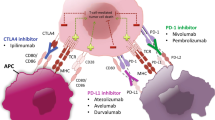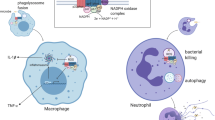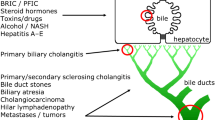Abstract
Purpose of Review
Gastrointestinal complications are very common in patients undergoing cancer treatment. Some of these complications can be life threatening and require prompt and appropriate diagnosis and treatment. The purpose of this review is to address luminal gastrointestinal and hepatic complications associated with a new class of anticancer drugs, immune checkpoint inhibitors (CPIs), and focuses on the identification, evaluation, and management of the complications associated with this class of drugs.
Recent Findings
It is now recognized that immune checkpoint inhibitors are frequently associated with luminal GI side effects such as diarrhea and enterocolitis and hepatic complications such as hepatitis. While colitis associated with CPIs, to some extent, mimics that found in idiopathic inflammatory bowel disease, the complex interplay of genes, the environment, the immune system, and the microbiome make it difficult to fully differentiate these conditions clinically. CPI-induced hepatitis is most often associated with a pattern of hepatocellular injury with panlobular hepatitis. A variety of biomarkers have been proposed to predict an adverse response to CPIs and are under investigation. It has been proposed that alterations in the microbiome may impact the risk of developing colitis, and these studies are reviewed. In contrast to idiopathic chronic inflammatory bowel disease, CPI-induced colitis is often reversible if rapidly treated in accordance with the immune-mediated adverse reaction management guidelines. Treatment algorithms have been suggested but are, to some extent, empiric and based on algorithms for the treatment of idiopathic inflammatory bowel disorders.
Summary
CPIs may be associated with significant GI complications which impact their successful use in the treatment of neoplastic diseases. Much of what we currently know about the mechanisms and treatment of these complications is empiric and extrapolated from experience with idiopathic inflammatory bowel disease and other immune disorders. Current research focuses on understanding genetic predisposition and the role of the microbiome and identifying predictive risk markers for developing complications.
Similar content being viewed by others
References
Papers of particular interest, published recently, have been highlighted as: • Of importance •• Of major importance
Lu J, Lee-Gabel L, Nadeau MC, et al. Clinical evaluation of compounds targeting PD-1/PD-L1 pathway for cancer immunotherapy. J Oncol Pharm Pract. 2014;21:451–67.
Merrill SP, Reynolds P, Kalra A, et al. Early administration of infliximab for severe ipilimumab-related diarrhea in a critically ill patient. Ann Pharmacother. 2014;48:806–10.
Iwai Y, Ishida M, Tanaka Y, et al. Involvement of PD-L1 on tumor cells in the escape from host immune system and tumor immunotherapy by PD-L1 blockade. Proc Natl Acad Sci. 2002;99:12293–7.
Pardoll DM. The blockade of immune checkpoints in cancer immunotherapy. Nat Rev Cancer. 2012;12:252–64.
Brahmer JR, Tykodi SS, Chow LQM, et al. Safety and activity of anti-PD-L1 antibody in patients with advanced cancer. N Engl J Med. 2012;366:2455–65.
Schadendorf D, Hodi FS, Robert C, et al. Pooled analysis of long-term survival data from phase II and phase III trials of ipilimumab in unresectable or metastatic melanoma. J Clin Oncol. 2015;33:1889–94.
Manson G, Norwood J, Marabelle A, et al. Biomarkers associated with checkpoint inhibitors. Ann Oncol. 2016;27:1199–206.
•• Marthey L, Mateus C, Mussini C, et al. Cancer immunotherapy with anti-CTLA-4 monoclonal antibodies induces an inflammatory bowel disease. J Crohn’s Colitis. 2016;10:395–401. This study provides common laboratory, endoscopic, and histologic findings associated with anti-CTLA-4 gastrointestinal adverse events.
Hodi FS, O’Day SJ, McDermott DF, et al. Improved survival with ipilimumab in patients with metastatic melanoma. N Engl J Med. 2010;363:711–23.
Gonzalez-Cao M, Boada A, Teixidó C, et al. Fatal gastrointestinal toxicity with ipilimumab after BRAF/MEK inhibitor combination in a melanoma patient achieving pathological complete response. Oncotarget 2016;7:56619–56627.
Verschuren EC, Eertwegh AJ, Wonders J, et al. Clinical, endoscopic, and histologic characteristics of ipilimumab-associated colitis. Clin Gastroenterol Hepatol. 2016;14:836–42.
Beck KE, Blansfield JA, Tran KQ, et al. Enterocolitis in patients with cancer after antibody blockade of cytotoxic T-lymphocyte-associated antigen 4. J Clin Oncol. 2016;24:2283–9.
Eigentler TK, Hassel JC, Berking C, et al. Diagnosis, monitoring and management of immune-related adverse drug reactions of anti-PD-1 antibody therapy. Cancer Treat Rev. 2016;45:7–18.
Berman D, Parker SM, Siegel J, et al. Blockade of cytotoxic T-lymphocyte antigen-4 by ipilimumab results in dysregulation of gastrointestinal immunity in patients with advanced melanoma. Cancer Immun; 2010;10:11.
Ina K, Itoh J, Fukushima K, et al. Resistance of Crohn’s disease T cells to multiple apoptotic signals is associated with a Bcl-2/Bax mucosal imbalance. J Immunol. 2009;163:1081–90.
Souza HS, West GA, Rebert N, et al. Increased levels of survivin, via association with heat shock protein 90, in mucosal T cells from patients with Crohn’s disease. Gastroenterology. 2012;143:1017–26.e9.
Shaw MH, Kamada N, Warner N, et al. The ever-expanding function of NOD2: autophagy, viral recognition, and T cell activation. Trends Immunol. 2011;32:73–9.
Venditti O, Lisi DD, Caricato M, et al. Ipilimumab and immune-mediated adverse events: a case report of anti-CTLA4 induced ileitis. BMC Cancer. 2015;15:87.
Pariente B, Mocan I, Camus M, et al. Activation of the receptor NKG2D leads to production of Th17 cytokines in CD4+ T cells of patients with Crohn’s disease. Gastroenterology. 2011;141:217–26.
Fuss IJ, Joshi B, Yang Z, Degheidy H, et al. IL-13Rα2-bearing, type II NKT cells reactive to sulfatide self-antigen populate the mucosa of ulcerative colitis. Gut. 2014;63:1728–36.
Feakins RM. Ulcerative colitis or Crohn’s disease? Pitfalls and problems. Histopathology. 2013;64:317–35.
Souza HS, Fiocchi C. Immunopathogenesis of IBD: current state of the art. Nat Rev Gastroenterol Hepatol. 2015;13:13–27.
Giacomo AM, Biagioli M, Maio M. The emerging toxicity profiles of anti-CTLA-4 antibodies across clinical indications. Semin Oncol. 2010;37:499–507.
Kim KW, Ramaiya NH, Krajewski KM, et al. Ipilimumab associated hepatitis: imaging and clinicopathologic findings. Investig New Drugs. 2013;31:1071–7.
Kleiner DE, Berman D. Pathologic changes in ipilimumab-related hepatitis in patients with metastatic melanoma. Dig Dis Sci. 2012;57:2233–40.
Suzuki A, Brunt EM, Kleiner DE, et al. The use of liver biopsy evaluation in discrimination of idiopathic autoimmune hepatitis versus drug-induced liver injury. Hepatology. 2011;54:931–9.
Sulz MC, Gerlach TJ. Autoimmune hepatitis. Ther Umsch. 2011;68:189–94.
Suriawinata AA, Thung SN. Acute and chronic hepatitis. Semin Diagn Pathol. 2006;23:132–48.
Lucey MR, Mathurin P, Morgan TR. Alcoholic hepatitis. N Engl J Med. 2009;360:2758–69.
Tivol EA, Borriello F, Schweitzer A, et al. Loss of CTLA-4 leads to massive lymphoproliferation and fatal multiorgan tissue destruction, revealing a critical negative regulatory role of CTLA-4. Immunity. 1995;3:541–7.
Lee YH, Kim J, Seo YH, et al. CTLA-4 polymorphisms and susceptibility to inflammatory bowel disease: a meta-analysis. Hum Immunol. 2014;75:414–21.
Carbognin L, Pilotto S, Milella M, et al. Differential activity of nivolumab, pembrolizumab and MPDL3280A according to the tumor expression of programmed death-ligand-1 (PD-L1): sensitivity analysis of trials in melanoma, lung and genitourinary cancers. PLoS ONE. 2015;10, e0130142.
Larkin J, Chiarion-Sileni V, Gonzalez R, et al. Combined nivolumab and ipilimumab or monotherapy in untreated melanoma. N Engl J Med. 2015;373:23–34.
Postow MA, Cardona DM, Taube JM, et al. Peripheral and tumor immune correlates in patients with advanced melanoma treated with nivolumab (anti-PD-1, BMS-936558, ONO-4538) monotherapy or in combination with ipilimumab. J Transl Med. 2014;12 Suppl 1:08.
Baroudjian B, Lourenco N, Pagès C, et al. Anti-PD1-induced collagenous colitis in a melanoma patient. Melanoma Res. 2016;26:308–11.
• Shahabi V, Berman D, Chasalow SD, et al. Gene expression profiling of whole blood in ipilimumab-treated patients for identification of potential biomarkers of immune-related gastrointestinal adverse events. J Transl. 2013;11:75. Alterations in a number of biomarkers have been correlated with both treatment efficacy and the development of gastrointestinal toxic events of immune checkpoint inhibitors. This paper suggests that gene expression profiling could play an important role in future treatment decisions and prevention of irAEs.
Tarhini AA, Zahoor H, Lin Y, et al. Baseline circulating IL-17 predicts toxicity while TGF-β1 and IL-10 are prognostic of relapse in ipilimumab neoadjuvant therapy of melanoma. J Immunother Cancer. 2015;3:39.
Quinton J-F, Sendid B, Duthilleul P, et al. Anti-Saccharomyces cerevisiae mannan antibodies combined with antineutrophil cytoplasmic autoantibodies in inflammatory bowel disease: prevalence and diagnostic role. Gut. 1998;42:788–91.
• Vétizou M, Pitt JM, Daillère R, et al. Anticancer immunotherapy by CTLA-4 blockade relies on the gut microbiota. Science. 2015;350:1079–84. Understanding the role of the gut microbiota in CTLA-4 blockade is critical in both treatment efficacy and the development of adverse events. Certain commensals might serve as anticancer probiotics, while others might even antagonize anticancer efficacy.
Kuroki F, Iida M, Tominaga M, et al. Multiple vitamin status in Crohn’s disease. Dig Dis Sci. 1993;38:1614–8.
Ellestad-Sayed JJ, Nelson RA, Adson MA, et al. Pantothenic acid, coenzyme A, and human chronic ulcerative and granulomatous colitis. Am J Clin Nutr. 1976;29:1333–8.
Dubin K, Callahan MK, Ren B, et al. Intestinal microbiome analyses identify melanoma patients at risk for checkpoint-blockade-induced colitis. Nat Commun. 2016;7:10391.
Johnson DB, Sullivan RJ, Ott PA, et al. Ipilimumab therapy in patients with advanced melanoma and preexisting autoimmune disorders. JAMA Oncol. 2016;2:234.
Bostwick AD, Salama AK, Hanks BA. Rapid complete response of metastatic melanoma in a patient undergoing ipilimumab immunotherapy in the setting of active ulcerative colitis. J Immunother Cancer. 2015;3:19.
Tobias L. A briefing report on autoimmune diseases and AARDA: past, present, and future. Eastpointe: American Autoimmune Related Diseases Association (AARDA) 2010.
Common Terminology Criteria for Adverse Events (CTCAE). Retrieved August 1, 2016, from http://evs.nci.nih.gov/ftp1/CTCAE/CTCAE_4.03_2010-06-14_QuickReference_8.5x11.pdf. 2010.
Weber J, Thompson JA, Hamid O, et al. A randomized, double-blind, placebo-controlled, phase II study comparing the tolerability and efficacy of ipilimumab administered with or without prophylactic budesonide in patients with unresectable stage III or IV melanoma. Clin Cancer Res. 2009;15:559.
Hinrichs CS, Palmer DC, Rosenberg SA, et al. Glucocorticoids do not inhibit antitumor activity of activated CD8 T cells. J Immunother. 2005;28:517–24.
Weber JS, Postow M, Lao CD, et al. Management of adverse events following treatment with anti-programmed death-1 agents. Oncologist. 2016;21(10):1230–40.
Johnston RL, Lutzky J, Chodhry A, et al. Cytotoxic T-lymphocyte-associated antigen 4 antibody-induced colitis and its management with infliximab. Dig Dis Sci. 2009;54:2538–40.
Pagès C, Gornet JM, Monsel G, et al. Ipilimumab-induced acute severe colitis treated by infliximab. Melanoma Res. 2013;23:227–30.
Targownik LE, Bernstein CN. Infectious and malignant complications of TNF inhibitor therapy in IBD. Am J Gastroenterol. 2013;108:1835–42.
Acknowledgements
Thanks to Editor-in-Chief Joel Richter for the help in reviewing this paper.
Author information
Authors and Affiliations
Corresponding author
Ethics declarations
Conflict of Interest
The authors declare that they have no conflict of interest.
Human and Animal Rights and Informed Consent
This article does not contain any studies with human or animal subjects performed by any of the authors.
Additional information
This article is part of the Topical Collection on GI Oncology
Rights and permissions
About this article
Cite this article
Cramer, P., Bresalier, R.S. Gastrointestinal and Hepatic Complications of Immune Checkpoint Inhibitors. Curr Gastroenterol Rep 19, 3 (2017). https://doi.org/10.1007/s11894-017-0540-6
Published:
DOI: https://doi.org/10.1007/s11894-017-0540-6




